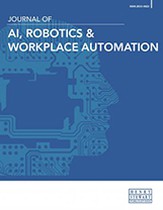Towards a capability assessment model for the comprehension and adoption of AI in organisations
Abstract
The comprehension and adoption of artificial intelligence (AI) are beset with practical and ethical problems. This paper presents a five-level AI capability assessment model (AI-CAM) and a related AI capabilities matrix (AI-CM) to assist practitioners in AI comprehension and adoption. These practical tools were developed with business executives, technologists and other organisational stakeholders in mind. They are founded on a comprehensive conception of AI compared with those in other AI adoption models and are also open-source artefacts. Thus, the AI-CAM and AI-CM present an accessible resource to help inform organisational decision makers on the capability requirements for: 1) AI-based data analytics use cases based on machine learning technologies; 2) knowledge representation to engineer and represent data, information and knowledge using semantic technologies; and 3) AI-based solutions that seek to emulate human reasoning and decision making. The AI-CAM covers the core capability dimensions (business, data, technology, organisation, AI skills, risks and ethical considerations) required at the five levels of capability maturity to achieve optimal use of AI in organisations. The AI-CM details the related individual and team-level capabilities needed to reach each level in organisational AI capability; it therefore extends and enriches existing perspectives by introducing knowledge and skills requirements at all levels of an organisation. It posits three levels of AI proficiency: 1) basic, for operational users who interact with AI and participate in AI adoption; 2) advanced, for professionals who are charged with comprehending AI and developing related business models and strategies; and 3) expert, for computer engineers, data scientists and knowledge engineers participating in the design and implementation of AI-based technologies to support business use cases. In conclusion, the AI-CAM and AI-CM present a valuable resource for practitioners, businesses and technologists looking to innovate using AI technologies and maximise the return to their organisations.
The full article is available to subscribers to the journal.
Author's Biography
Tom Butler is Professor and Principal Investigator of the Governance, Risk and Compliance (GRC) Technology Centre, University College Cork, Ireland. Tom’s research at the GRCTC focuses on the development of RegTech and RiskTech solutions for the financial and legal sector. Specifically, his research focuses on applying innovative digital technologies (based on semantic technologies, ontologies, artificial intelligence, machine learning and risk data virtualisation) to address the problems of risk management and regulatory compliance and reporting in the financial industry.
Angelina Espinoza-Limón PhD is a Marie Skłodowska-Curie Career-FIT Research Fellow at University College Cork and funded by Enterprise Ireland. Previously as associate professor at UAM Mexico, Angelina has led projects funded by PROMEP in Mexico and Royal Society and Royal Academy of Engineering in UK, and advised start-up companies about semantic technology solutions. She initially worked as software engineer in various companies and has published journal and conference papers on a range of topics in software engineering and semantic technologies applied to domains, such as healthcare, energy and finance.
Selja Seppälä PhD is a Marie Skłodowska-Curie Career-FIT Research Fellow in the Department of Business Information Systems, University College Cork (UCC), investigating natural language processing (NLP) methods to develop a computer-assisted definition authoring and formalisation system for legal experts (RegDef). She has conducted research in NLP for regulatory technologies in the financial industry at the Governance, Risk and Compliance Technology Centre (GRCTC) at UCC and applied ontology and biomedical informatics at the University of Florida and the State University of New York at Buffalo, where her research was funded by the Swiss National Science Foundation. Selja has published in the fields of NLP, terminology and applied ontology.
